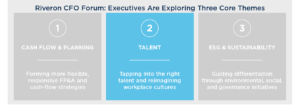CFOs Share Top Concerns – Part 2: Talent Strategies
Focusing on growth amid economic uncertainty? CFOs share key trends to move your organization forward.
Riveron recently convened several chief financial officers (CFOs), including those from public and private equity-backed organizations, to examine emerging trends shaping today’s uncertain business landscape. CFOs are especially focused across three core areas, with talent strategies playing a central role:

Today’s talent pool remains a critical success factor for company leaders
Although the so-called war for talent can vary in intensity depending on seasonal or economic patterns, attracting and retaining talent persists as a big challenge and budget line item for CFOs—regardless of industry. Investments in talent are investments in the future of the company, and, ultimately, high-performing talent and teams drive performance and growth. In many cases, wages are a key component to success, and organizations are significantly increasing their pay scales in order to remain competitive. In certain organizations, increasing wages isn’t just happening in higher-level positions like IT executives or senior management but for administrative and clerk jobs as well. Further, compensation adjustments can only go so far—there is a limit to how high companies can increase wages, especially when growing, middle-market organizations are competing against established, deep-pocketed corporations and multinational organizations.
“Our company is never going to be a talent magnet like Google, …but if we can get them in the door… and hooked on the values and the team, and they see a path for growth—I think we’re going to be reliant on that versus what we can pay employees.”
-CFO Forum Participant
With employee resources top of mind as companies consider approaches to a possible recession, the conversation on compensation planning reinforces the need for companies to establish a culture and values that are clearly communicated to the market in order to attract top talent. Similarly, companies must provide employee training, development, and benefits that keep top talent employed and contributing to business objectives. In the highly competitive talent market, a strong mission and a commitment to environmental, social, and governance (ESG) programs can be distinguishing factors for potential talent, especially in key demographics that firms have been struggling to recruit (such as younger workers). Data from both public and private companies suggests that a mission linked to ESG concerns correlates to higher employee morale and retention rates.
Additionally, companies are offering remote or hybrid work to remain competitive in attracting and retaining talent. Many executive leadership teams are pressing for a return to on-site work, and CFOs are working to find a balance where employees come in three or four days a week in order to foster collaboration and workplace culture. Even so, several of the leaders shared that they are treading lightly on in-office policies because they are already experiencing pushback from employees. Although remote and hybrid work arrangements are unlikely to go away, there are younger Generation Z professionals who want to come into the office to network, receive mentorship, and gain project experience. In response, leaders are working to create leadership development and advancement tracks for early-in-career professionals as part of recruiting and retention efforts. Plus, these workers can be acquired comparatively inexpensively and trained in skills that help them grow as professionals within the company.
Read other CFO perspectives in this series, including Part 1: Cash Flow & Planning considerations plus insights on enabling a competitive edge through social and sustainability-focused strategies in Part 3: ESG.
[1] Riveron CFO Forum hosts included Matt Bender, Eric Markovich, and Beth Saunders.

